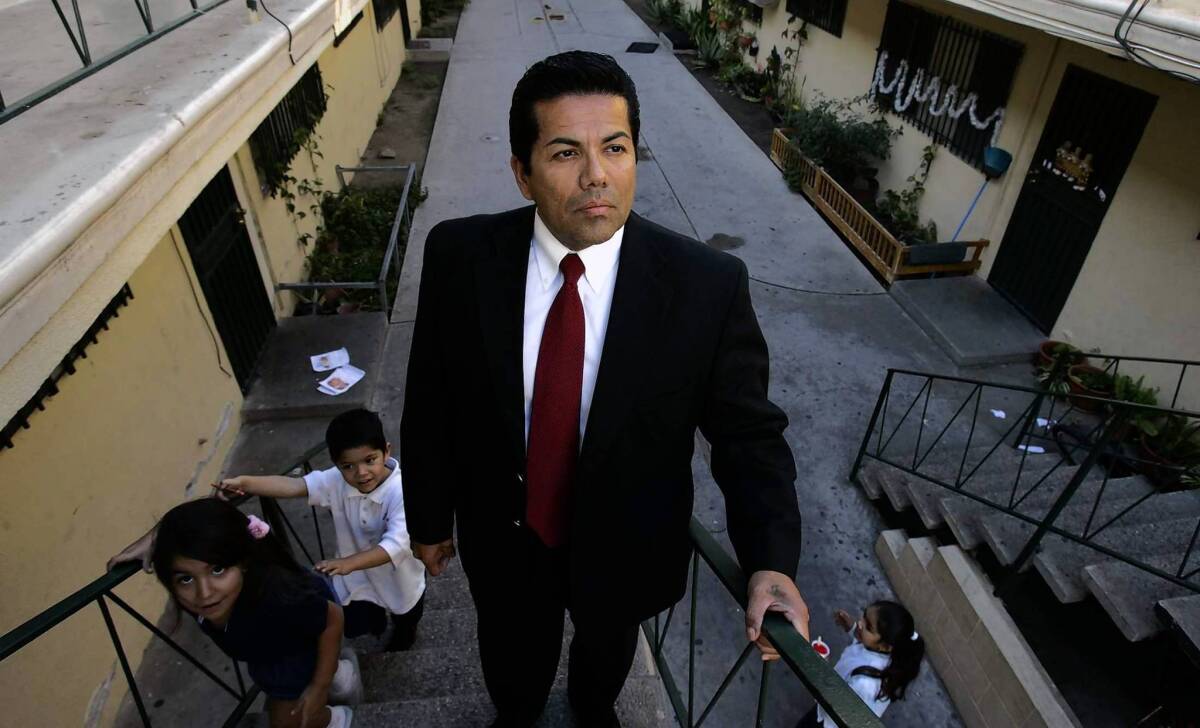Former Cudahy city manager may have taken improper raises

- Share via
The former city manager of Cudahy, who worked his way from janitor to the top of the municipal ladder, appears to have improperly given himself annual cost-of-living raises meant for rank-and-file workers, according to city records.
George Perez, who was fired in 2011 after 11 years on the job, had a contract that guaranteed an 8% annual raise. He also received 12 weeks of vacation each year and sick time that he could cash in.
But city records show that for many years, he also took an additional cost-of-living increase of 2% to 3.5%.
There is no record that the City Council approved Perez’s cost-of-living increases, according to Hector Rodriguez, Cudahy’s current city manager.
“If he is receiving additional compensation not authorized by the council or law, we’d certainly want to take a look at it,” said David Demerjian, head of the Los Angeles County district attorney’s Public Integrity Division. “If he has this written contract, that certainly should be the entirety of his compensation.”
Perez, whose final annual paycheck was $186,000, is suing the small, working-class city in southeast Los Angeles, saying that he is owed 18 months in severance pay.
Perez’s attorney, Stanley L. Friedman, said his client told him he received cost-of-living raises of 1% to 1.5% a year that the council approved.
“That would be troubling if he raised his own salary,” Friedman said.
The city manager’s position is not covered in the memorandum of understanding between the city and the Cudahy Miscellaneous Employees’ Assn., which outlines cost-of-living raises for civic workers.
Perez, who was fired without explanation by the council, also earned $23,500 as a director of a private company that provides water to Cudahy, raising questions of conflict of interest. In the dual roles, Perez was both seller and buyer — setting rates for the water that was sold to the city, and then advising the city on buying it.
The Times previously reported that under Perez, the densely packed city missed a chance to expand one of its few parks by failing to account for $250,000 it received from a state parks grant. The state demanded that the money be returned, and the deadline expired for the full $2.5 million the city was supposed to receive.
Assemblyman Ricardo Lara (D-Bell Gardens) saved the project in 2011 with an extension.
Mayor Josue Barrios, who was elected to the council in 2009, said he was unaware the former city manager was receiving the extra cost-of-living increases. The other four councilmen, all longtime members of the panel, did not return phone calls or emails seeking comment.
Perez, who was a city janitor before he was elected to the council in 1994, was appointed city manager in 2000 at an income of $88,892 annually, with a yearly raise equivalent to the increase in the consumer price index.
His subsequent contract stipulated that he would receive an annual raise equivalent to the CPI increase or 8%, whichever was greater. His salary, which became effective April 16, 2003, was $100,286 per year.
Perez received a 2% cost-of-living increase 21/2 months later, according to records reviewed by The Times.
For the next five years, Perez received an 8% increase each April, and a cost-of-living raise of 2% to 3.5% three months later.
In October 2008, he signed another five-year contract, starting at $172,548, with similar terms.
Although the new contract specified that he was to receive his raise each October, city records show he received his 8% salary increase in April 2009, six months early.
Friedman, Perez’s attorney, said his client didn’t take his last raises because of the city’s poor financial condition. Cudahy is one of Los Angeles County’s poorest cities.
While researching a records request from The Times, Cudahy’s new city manager and city attorney said they discovered that the city’s records were in disarray.
They found draft council meeting minutes for 2003 and 2008 that were never approved and audio recordings of meetings for 2005 and 2006 that had not been transcribed. The draft minutes do not mention any cost-of-living increase for Perez. Neither do the minutes for the years the City Council formally approved minutes.
“We’re appalled,” said Richard Padilla, the assistant city attorney.
Larry Galvan, the longtime city clerk, blamed city staff for throwing away documents he kept in his office. Galvan was suspended by the city in 2011 at the same time Perez was fired. He later filed for retirement.
Asked why the tapes of the council meetings weren’t transcribed, he replied, “I decided not to.”
Galvan claimed that as long as the meetings were taped, there was no need for minutes. Galvan hung up during an interview.
Municipal government experts said they were surprised that the city had failed to produce minutes for so many meetings. Such minutes provide a record of council actions.
Michael Jenkins, an adjunct professor of law at USC who serves as city attorney for several Los Angeles County cities, said the state government code has been interpreted to mean that cities must keep minutes.
“You have to have some written record of what happened at meetings, even if it’s just who made a motion, who seconded it and what the vote was,” he said.
More to Read
Sign up for Essential California
The most important California stories and recommendations in your inbox every morning.
You may occasionally receive promotional content from the Los Angeles Times.











